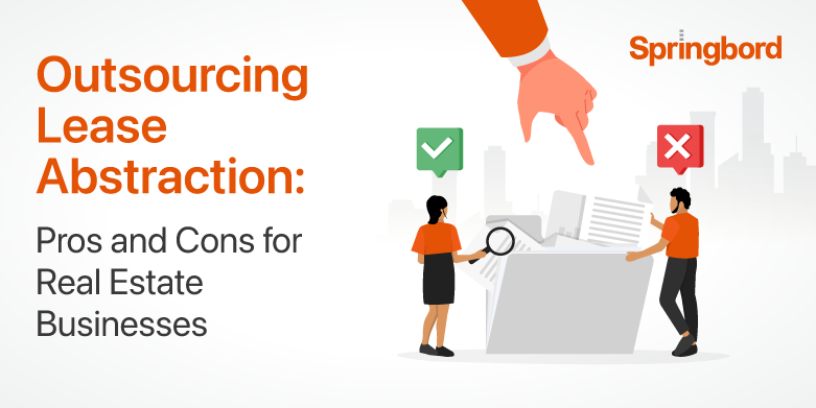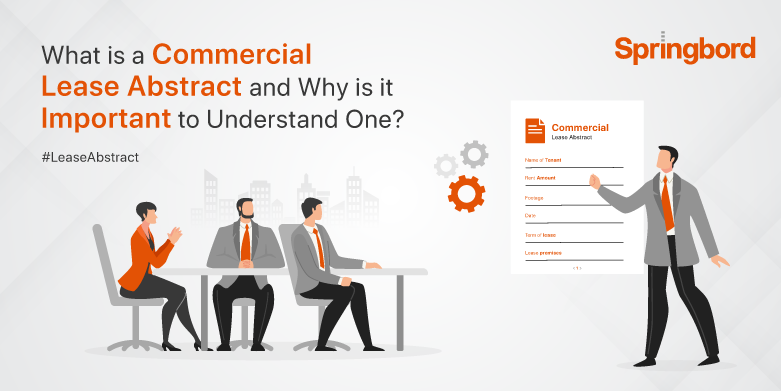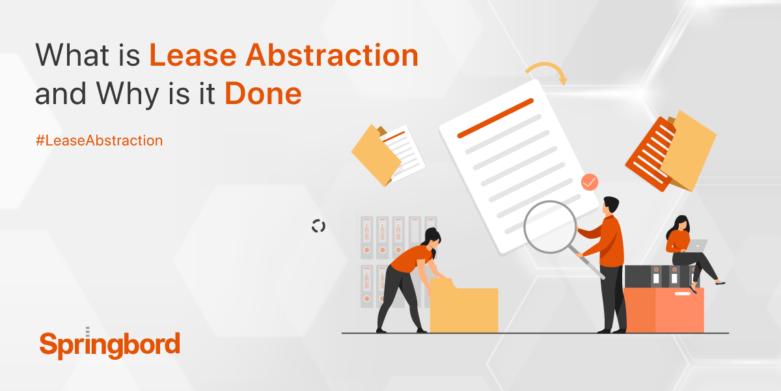 Read time 7 min
Read time 7 minLease abstraction is vital in real estate management, condensing key information from complex lease agreements for property owners and managers. Every clause shapes a property’s financial and operational landscape, influencing profitability and strategy. From rental rates to maintenance responsibilities, lease intricacies impact decision-making. Despite its importance, real estate businesses often face challenges due to the volume and complexity of leases.
In real estate, accurate lease data abstraction is crucial for assessing risks, optimizing portfolios, and driving strategic initiatives. Yet, amidst vast lease volumes and complexities, businesses often face efficiency challenges.
Challenges Faced by Real Estate Businesses
Real estate businesses operate in a dynamic environment characterised by evolving regulatory landscapes and complex lease agreements. Managing a vast number of leases while staying compliant with regulations presents significant challenges for these businesses. In response to these challenges, real estate businesses are increasingly turning to strategic solutions such as outsourcing lease abstraction to streamline operations and enhance accuracy.
Let’s explore the key challenges faced by real estate businesses and the strategic solutions they are adopting to overcome them, with a focus on Springbord’s innovative approach to lease abstraction.
Volume and Complexity of Leases:
Real estate businesses often manage a vast number of lease agreements, each containing intricate details and clauses. Navigating through these numerous leases presents significant challenges, as extracting actionable insights becomes daunting due to the sheer volume and complexity involved. Lease agreements can vary greatly in terms of terms, conditions, and obligations, making it challenging to identify and prioritize key information. Without efficient methods for managing this volume and complexity, businesses may struggle to extract meaningful insights and make informed decisions.
Manual Abstraction Processes:
Traditional methods of lease abstraction often involve manual processes, which are time-consuming and prone to errors. Manually abstracting lease data requires meticulous attention to detail, and even small mistakes can lead to inefficiencies and inaccuracies in decision-making. Moreover, manual abstraction methods hinder productivity, as they require significant time and resources to extract, organize, and analyze lease information. These inefficiencies can impede the ability of real estate businesses to extract meaningful insights from lease agreements and make informed decisions about their properties.
Evolution of Regulatory Landscape:
The regulatory landscape governing real estate management is constantly evolving, with new compliance requirements and reporting standards emerging regularly. Real estate businesses must stay abreast of these changes to ensure compliance and avoid costly penalties and reputational damage. Failure to comply with regulations can have serious consequences, including legal liabilities and loss of trust among stakeholders. As such, staying informed about the evolving regulatory landscape is crucial for real estate businesses to mitigate risks and maintain their reputation in the industry.
Strategic Solutions:
To address these challenges, real estate businesses are increasingly turning to strategic solutions such as outsourcing lease abstraction. Outsourcing provides access to specialized expertise, scalable resources, and cost-efficient solutions, enabling organizations to streamline operations and enhance accuracy in lease abstraction processes. By entrusting abstraction to external service providers, businesses can leverage the expertise and efficiency of dedicated professionals while freeing up internal resources to focus on core activities. Additionally, outsourcing allows businesses to adapt to fluctuating workloads and market conditions more effectively, ensuring that they remain agile and competitive in the dynamic real estate industry.
By addressing these challenges and providing innovative solutions, Springbord, with its proven track record in delivering comprehensive real estate solutions, stands at the forefront of this transformative trend. Leveraging cutting-edge technologies and a team of seasoned professionals, Springbord empowers clients to navigate the complexities of lease abstraction with confidence and precision. From cost-effective scalability to stringent data security measures, Springbord offers a holistic approach tailored to meet the diverse needs of real estate businesses.
Lease Abstraction
Lease abstraction serves as a fundamental process, laying the groundwork for informed decision-making and strategic planning. This intricate process involves distilling essential information from complex lease agreements into concise, structured formats, enabling property owners and managers to gain valuable insights into their portfolios.
Core Components of Lease Abstraction:
Lease abstraction encompasses a wide array of critical components, each playing a pivotal role in shaping the operational and financial landscape of a property. These components typically include:
Financial Terms: Financial terms within a lease agreement, such as rental rates, escalation clauses, and payment schedules, form the backbone of lease abstraction. Understanding these terms is essential for assessing the revenue potential of a property and projecting future cash flows.
Operational Obligations: Lease agreements often entail various operational obligations, including maintenance responsibilities, repair clauses, and utility provisions. Abstraction of these obligations provides insights into the operational requirements and costs associated with managing a property.
Lease Terms and Clauses: Key lease terms and clauses, such as lease duration, renewal options, and termination provisions, influence the long-term viability and flexibility of a property. Abstraction of these terms helps stakeholders assess lease maturity profiles and mitigate potential risks.
Compliance and Regulatory Requirements: Ensuring compliance with regulatory mandates and reporting requirements is paramount in real estate management. Abstraction of relevant compliance obligations and regulatory provisions enables organizations to stay abreast of legal obligations and avoid potential liabilities.
Critical Dates and Milestones: Lease agreements often contain critical dates and milestones, such as lease commencement dates, renewal deadlines, and option exercise periods. Abstraction of these dates facilitates proactive lease management and strategic decision-making.
Systematically abstracting these core components grants real estate businesses a comprehensive understanding of their lease portfolios, facilitating opportunity identification, risk mitigation, and operational optimization.
The Importance of Accuracy: Impact on Decision-making Processes
Accuracy in lease abstraction is paramount for informed decision-making processes. Inaccuracies or omissions in abstracted lease data can lead to misinterpretations, miscalculations, and flawed strategic decisions, potentially resulting in missed revenue opportunities, increased operational costs, and legal disputes. Recognizing this significance,
Springbord prioritizes precision in its lease abstraction processes. With meticulous attention to detail and a steadfast commitment to quality, Springbord ensures that every abstraction accurately reflects the terms, obligations, and nuances of lease agreements. Leveraging advanced technologies and a team of seasoned professionals, Springbord delivers precise and reliable solutions tailored to meet the unique needs of its clients.
Pros of Outsourcing Lease Abstraction
In real estate management, outsourcing lease abstraction has become essential for enhancing efficiency, accuracy, and growth. Real estate businesses increasingly opt for outsourcing to streamline operations, gain expertise, and manage varying workloads. Outsourcing lease abstraction offers several benefits, including cost efficiency, access to expertise, and scalability.
- Cost Efficiency:
Outsourcing reduces overhead expenses and staffing costs significantly. Research by Statista shows that 57% of respondents cite cost reduction as a primary motivation for outsourcing decisions. By eliminating infrastructure investments and training expenses, outsourcing allows businesses to allocate resources more effectively. Springbord delivers tangible savings through optimized operational efficiencies, enabling real estate businesses to redirect resources towards strategic initiatives.
- Access to Expertise:
Outsourcing provides access to specialized knowledge and skills not available in-house. External service providers bring a deep understanding of lease agreements, regulatory requirements, and industry best practices. Springbord’s team of seasoned professionals equipped with cutting-edge tools ensures clients benefit from superior expertise tailored to their needs, enhancing their competitive edge.
- Scalability and Flexibility:
External service providers offer flexible engagement models to adapt to fluctuating workloads. Outsourcing enables businesses to scale up during peak periods and downsize during lulls, optimizing resource allocation and meeting evolving demands. Springbord’s scalable solutions and customized service levels empower businesses to navigate dynamic market conditions seamlessly, driving operational excellence and sustainable growth.
Cons of Outsourcing Lease Abstraction
While outsourcing lease abstraction offers numerous benefits, it also presents certain challenges and considerations that real estate businesses must carefully evaluate. Let’s look into the potential drawbacks of outsourcing lease abstraction, focusing on security risks, communication challenges, and the loss of control over critical processes.
- Security Risks:
Outsourcing lease abstraction raises concerns about data confidentiality and security. Real estate businesses handle sensitive information, making them vulnerable to breaches. Springbord prioritizes data security with stringent protocols, ensuring client data remains protected.
- Communication Challenges:
Effective collaboration with third-party providers can be challenging due to time zones and language barriers. Springbord facilitates clear communication, fostering collaborative partnerships.
- Loss of Control:
Outsourcing involves relinquishing some control over critical processes. Springbord provides transparent reporting, ensuring clients retain visibility and control.
Best Practices for Outsourcing Lease Abstraction
Outsourcing lease abstraction can yield significant benefits for real estate businesses, provided that the process is managed effectively. Here we explore best practices for outsourcing lease abstraction, focusing on establishing clear expectations, regular monitoring and feedback, and fostering continuous improvement.
Establishing Clear Expectations:
Clear communication is crucial for successful outsourcing engagements. Define project scope, objectives, and deliverables upfront to minimize misunderstandings and ensure value-aligned solutions. Springbord collaborates closely with clients, understanding requirements to develop customized solutions, and fostering transparency and clear communication.
Regular Monitoring and Feedback:
Implement robust monitoring mechanisms to track project progress and quality. Provide timely feedback to address issues proactively, ensuring high-quality outcomes. Springbord prioritizes regular monitoring and feedback, facilitating transparent reporting and progress updates, exceeding client expectations.
Continuous Improvement:
Foster collaborative partnerships to drive ongoing process optimization and innovation. Work closely with outsourcing partners to identify opportunities for efficiency gains and implement enhancements. Springbord collaborates with clients through performance reviews and feedback sessions, embracing continuous improvement to meet evolving industry challenges and drive long-term success.
In implementing these best practices, Springbord demonstrates its commitment to delivering exceptional value and driving success in outsourced lease abstraction engagements.
Conclusion:
Lease abstraction plays a vital role in real estate management, enabling businesses to extract actionable insights from complex lease agreements. By adhering to best practices such as establishing clear expectations, regular monitoring and feedback, and fostering continuous improvement, businesses can maximise the value of outsourced lease abstraction while mitigating risks. Springbord exemplifies this commitment to excellence, delivering tailored solutions and driving success in outsourced lease abstraction engagements.
Ready to optimise your lease abstraction process and unlock greater efficiency and accuracy? Contact Springbord today to discover how our innovative solutions can elevate your real estate management strategies.







